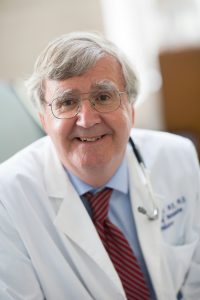Project Alive, a non-profit organization dedicated to finding a cure for Hunter syndrome, has surpassed its goal of raising $2.5 million dollars for a gene therapy clinical trial to be led by UNC School of Medicine researcher Joseph Muenzer, MD, PhD.

CHAPEL HILL, NC – The gene therapy trial has already received approval from the FDA for the investigational new drug application, so both UNC School of Medicine researchers and Project Alive are close to treating patients.
Individuals with Hunter syndrome, a rare genetic condition with a variety of symptoms, are missing a working copy of the gene that codes for the enzyme Iduronate 2-Sulfatase (IDS), which is crucial for cells to remove waste from major organs such as the brain, heart, liver, and spleen. Without the enzyme, waste builds up, eventually leading to medical complications and early death.
“Gene therapy holds lots of promise, and if we can get a working copy of the IDS gene into the patient, the hope is that it can produce the enzyme the children are missing,” said Joseph Muenzer, MD, PhD, professor of in the UNC Department of Pediatrics and lead investigator on the gene therapy trial, and member of the UNC Children’s Research Institute.
Fundraising is tough during normal times, but the pandemic has made it even harder for some organizations. Despite these trying times, Project Alive surpassed its goal to fund the clinical trial.
“As a rare disease community, we know a lot about resilience,” said Kim Stephens, Project Alive president. “Hunter syndrome is a progressive disease with our boys passing away between 10 to 15 years old. So, we have a limited time to try to save our boys’ lives. Our boys. We didn’t have the option of slowing down for the pandemic.”
When everything shut down last March, Project Alive had to reassess how it raised money. The organization was founded through grassroots efforts, so online fundraising and awareness has always been an integral part of the organizations’ mission. But now they had to be 100% dependent on online outreach. Project Alive found the Facebook fundraisers to be a tremendous success and a great way to get the Hunter syndrome community involved.
“Online fundraisers allow everyone to participate, regardless of their location. And with such a small population (1 in 110,000) of boys affected, it allows us to reach out to the broader community for help,” Stephens said.
Despite reaching the fundraising goal, Project Alive and the Hunter syndrome community still have a lot of work to do.
“We knew when we started down this road that the $2.5 million goal was a start,” Stephens said. “Investing in a clinical trial is a long process, and there will be challenges along the way. But we have seen a tremendous dedication to helping save our boys’ lives from those directly impacted by the disease and those who hear our stories. It is amazing the outpouring of love and support we have received from all over the world.”